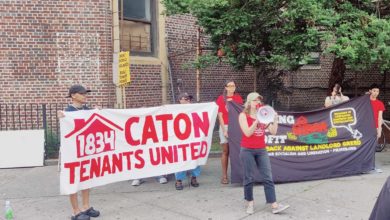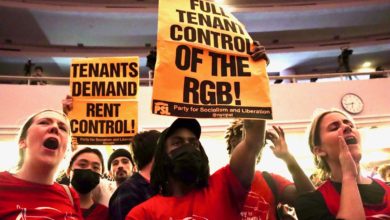Mobile home residents across the country are facing eviction from mobile park grounds. Big business redevelopers are buying mobile parks to convert them into more lucrative apartments, stores and offices.
|
Mobile park residents, even when they happen to own their trailers, are easy targets for eviction since they do not own the land. Some mobile homes can be relocated; however, many are too old to be moved or the moving costs are simply prohibitive.
The targets of these evictions include the elderly, the disabled and the poor. The mobile home parks provide affordable and secure homes to the residents, but at present they fail to provide maximum profits to the owners.
The March 3 issue of the Kentucky Kernel reports that the 6.8-acre Ingleside Mobile Home Park in Lexington, Ky., was bought by developer Neal Evans, who plans to do away with the single-family residences and turn it into a high-density apartment zone for students.
In August 2007, Evans told residents they might have to move, but would be “very well taken care of.” However, residents will receive only $1000, provided they sign an affidavit stating that they are abandoning their homes and leave them behind for demolition. If they choose to keep their mobile homes, which most of the residents actually own, then they will receive no compensation at all.
Considering the homes are worth at least $3,000, compensation payments of $1,000 are a measly and insulting offer. The terms of the offer are designed to encourage residents to turn it down.
Having to leave her mobile home behind, Ingleside Mobile Home Park resident Francis Barrera said, “It’s mine, and I’ve worked hard for the things I’ve got—I shouldn’t be forced to give them up.” Barrera could not afford the cost of moving her trailer. (Kentucky Kernel, March 17)
Although many residents remain in the park, some of the deserted mobile homes are already being demolished. A court ordered Evans to provide for the safety of residents during demolition, yet there have been sanitation problems from busted sewage pipes and looting from outsiders.
Owners undermine residents’ rights
According to a Feb. 27 Kalamazoo Gazette article, Franklin Valley Estates mobile park residents in Kalamazoo, Mich., have been served an eviction notice from KWN Properties, LLC. The company, owned and headed by Kenneth W. Newby, announced it is selling the park to a real estate developer who plans to build a 292-unit apartment complex and a 40,000-square-foot retail center.
A lawyer has advised the tenants that they have the right to object to the evictions and meet with the landlord to discuss the situation. The eviction notices lacked dates, signatures and a correct contact address where residents could direct their objections. Residents who do not speak English have found it particularly difficult to exercise their rights.
When Gerardo Galvan, his wife, and two-year-old son bought their mobile home a few months ago, they were not told the park was soon to be sold. Another couple in the park began looking for an apartment to rent after receiving their eviction notice, but most apartments rent for much more than their $280-per-month rent at Franklin Valley.
College Park Leisure Homes residents in Orange County, Fla., face similar conditions as the park owner plans to turn the area into new offices, shops and apartments. Seventeen of the residents refuse to move, stating that the $1,375 relocation offer is not enough. Most of the residents are elderly and do not have viable alternative housing options. (CFNews.com, Feb. 21)
In San Diego, Calif., more than 100 mobile home residents of the 6900 block of Mission Gorge Road are being displaced to make room for a 440-unit apartment project. As in Orange County’s College Park Leisure, most residents are elderly and had planned to spend the rest of their lives on the block. The project will knock down more affordable housing than it will create. (10news.com, March 18)
A Sept. 4, 2006, Daily News article reported that city officials from Santa Clarita, Calif., approved a redevelopment plan of the Canyon Breeze Village mobile park in 2004 that would create a 120,000 square foot of retail space and attached town houses.
However, other mobile parks in the surrounding area would only accept new mobile housing.
“They got no place to put us because they’re too old, but they’re holding up good,” said John Jones, 57, retiree from the Los Angeles Department of Water and Power and park who had resided there for 25 years. (Daily News, Sept. 4, 2006)
Despite complaints from the residents, the city government is not providing any support.
“With all of the growth in the area, I think that the idea of a shopping center is certainly an appropriate thing to do,” said city councilman Bob Kellar. “It will help … raise the bar, the standard, on that corner and be an added benefit for our residents.” (Daily News, Sept. 4, 2006)
Kellar means to say that the city will collect greater revenues from residents in a higher tax bracket than the mobile home owners, showing no concern whatsoever that the old residents may not find another place to live.
These evictions are forcing hard-working people out of their homes and their communities. Gentrification is not meant to “improve communities” or to meet the housing needs of the working class; it is a product of the profit-driven capitalist system. Affordable homes for all!






